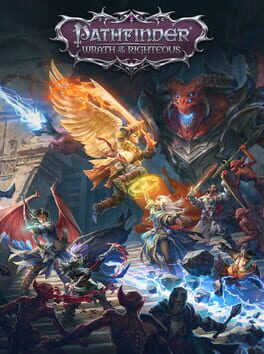No game in the lineage of isometric revival cRPGs captures the feeling of the all-time-great Baldur's Gate II quite the way that Wrath of the Righteous does—and that's including the recent, decades-removed sequel to the originals. While Pathfinder 1st Edition does make for a steep barrier of entry compared to both the AD&D of the original Infinity Engine games or the D&D 5th Edition of Larian's Baldur's Gate 3, the game's robust difficulty sliders allow for one to tune the experience to their personal tastes (personally, I recommend playing the Heroes of Might and Magic-inspired tactical RPG mini-game on a lower difficulty than normal, as one example)
Past that barrier of entry is a story of righteous wrath, as one might expect, but also one of both the redemptive power and the limits of love, from the romantic to the familial and platonic. Though the game is not fully voice acted, the limited voice acting is employed with care and craft to make key narrative moments land with extra impact, with lines delivered by an excellent cast (including Amelia Tyler, who would go on to earn acclaim as Baldur's Gate 3's omnipresent narrator)
Where the game shines most truly is in its character writing, particularly for the main cast of companion. With the aid of the aforementioned excellent voice acting, Owlcat delivers a cast of believable, nuanced companions that stand head and shoulders above those of other party-based RPGs, including those of Bioware, whose work has so clearly influenced the developers
These characters come alive in a tightly-crafted narrative experience that sees your character rise to power and given the power to save or damn the efforts of the Fifth Crusade. While this comes at the cost of some "player freedom," it makes for far stronger storytelling, and the replay value of both the robust class system of Pathfinder and Owlcat's version of mythic heroes, allowing you to direct your character's divine powers in one of 10 directions, including obvious paths like Angel and Demon, but also some that games of this sort rarely explore in depth, such as that of the necromantic Lich; the Aeon, a sort of cosmic judge
No, Wrath of the Righteous doesn't have the production values of a Dragon Age: Inquisition or Baldur's Gate 3, nor is it as approachable in its systems, but it more than makes up for it in its writing, storytelling, character work, and replay value—particularly for those sorts of players who love build-crafting. Just don't expect it to be something that it's not!
Past that barrier of entry is a story of righteous wrath, as one might expect, but also one of both the redemptive power and the limits of love, from the romantic to the familial and platonic. Though the game is not fully voice acted, the limited voice acting is employed with care and craft to make key narrative moments land with extra impact, with lines delivered by an excellent cast (including Amelia Tyler, who would go on to earn acclaim as Baldur's Gate 3's omnipresent narrator)
Where the game shines most truly is in its character writing, particularly for the main cast of companion. With the aid of the aforementioned excellent voice acting, Owlcat delivers a cast of believable, nuanced companions that stand head and shoulders above those of other party-based RPGs, including those of Bioware, whose work has so clearly influenced the developers
These characters come alive in a tightly-crafted narrative experience that sees your character rise to power and given the power to save or damn the efforts of the Fifth Crusade. While this comes at the cost of some "player freedom," it makes for far stronger storytelling, and the replay value of both the robust class system of Pathfinder and Owlcat's version of mythic heroes, allowing you to direct your character's divine powers in one of 10 directions, including obvious paths like Angel and Demon, but also some that games of this sort rarely explore in depth, such as that of the necromantic Lich; the Aeon, a sort of cosmic judge
No, Wrath of the Righteous doesn't have the production values of a Dragon Age: Inquisition or Baldur's Gate 3, nor is it as approachable in its systems, but it more than makes up for it in its writing, storytelling, character work, and replay value—particularly for those sorts of players who love build-crafting. Just don't expect it to be something that it's not!
